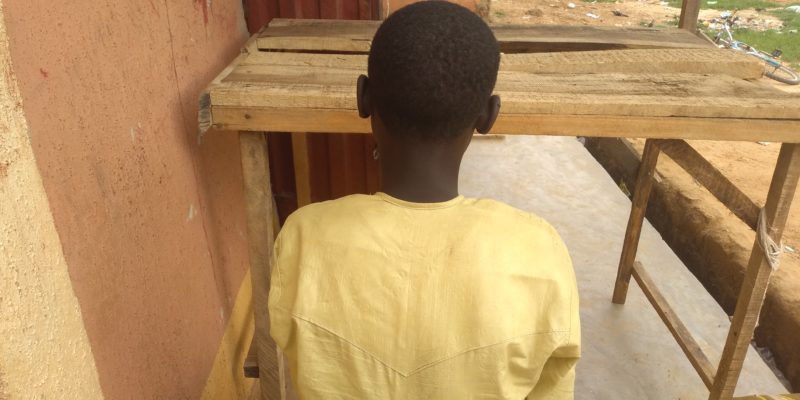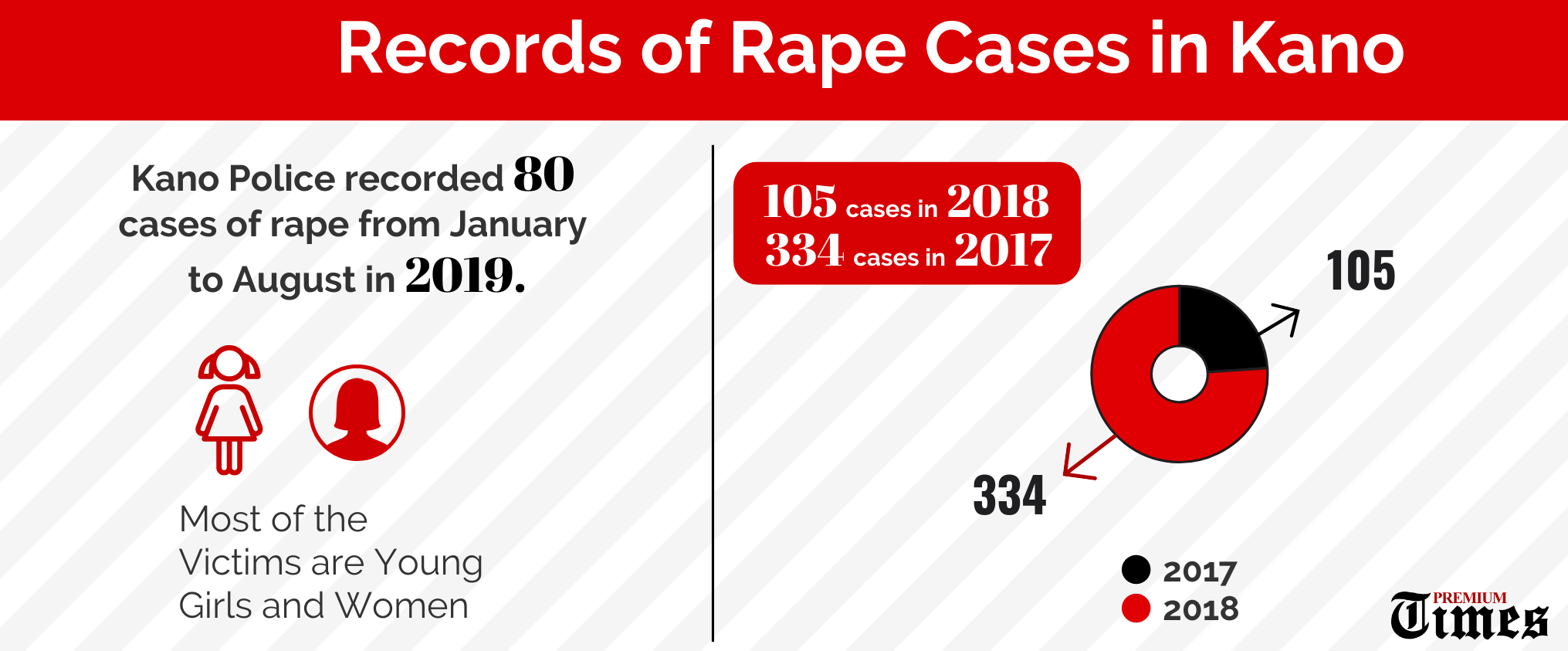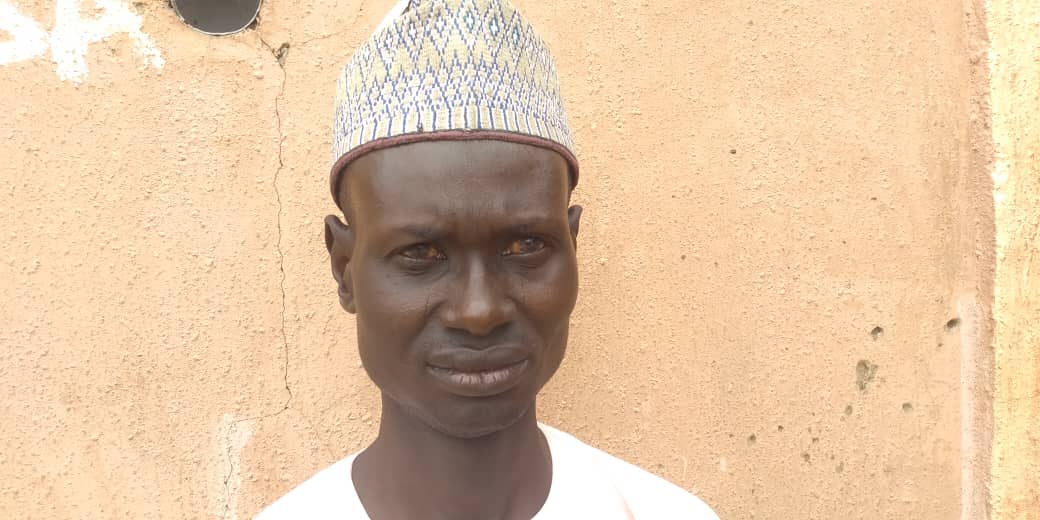It was a hot afternoon on Wednesday, June 5. The scorching sun bore no mercy on Haruna Dauda as he worked on hides in a micro industry located at Umar Babura road, Bompai, Kano.
While work was ongoing, Mr Dauda’s phone rang. He said he ignored the call first time, then later answered the call.
It was a distress call from his family.
“I relaxed, listening to her, she said you have to come back home. There’s a problem. Mustapha was brought back home, faeces is coming out from his anus uncontrollably; he was raped; his clothes were damaged by the faeces. We locked him inside a room because he is behaving abnormally and trying to flee,” Mr Dauda recounted the distress call to PREMIUM TIMES.
The 13-year-old Mustapha, a JSS 1 student, was the victim of the rape.
On getting home, Mr Dauda arranged for the teenager to be taken to the hospital. The hospital requested that the police must be involved before any treatment.
“I took the case to the police. The suspect identified as Aliyu Saminu lives in the same community. He was arrested and subsequently interrogated at the State Criminal Investigation Department (CID) where he made a confessional statement on how he was lured into the nefarious activity by other members of the society,” Mr Dauda, a resident of Kwajalawa-Zango community in Ungogo Local Government Area of Kano, told PREMIUM TIMES .
Charging the Suspect
After the arrest and interrogation, the suspect was charged before a Magistrate Court at Audu Bako Secretariat Complex on August 13. But the case was not mentioned that day.
The case was first slated for hearing on August 20 but the session could not hold due to the absence of the judge. A new date, September 11, was then slated.
On September 11, the court session could also not hold due to the judge’s absence. The court registrar again slated October 7 for hearing.
“With this prolonging of such kind of offence I doubt if at the end, justice would be served,” a frustrated Mr Dauda said.

He said his son has stopped going to school because of the trauma the incident caused him.
Rape Case
Mustapha’s case is not isolated. Recent statistics from the police have shown a growing trend of rape in Kano, a densely populated state in Nigeria’s North West.
The police in Kano said it recorded 80 cases of rape from January to August in 2019. In 2018, the figure was 105 and 334 in 2017. Rape victims are mostly young girls and women but also include boys like Mustapha.
The Sexual Assault Referral Centre in the state recorded a much higher figure than the police. The centre admits rape victims on self-referral, as well as from the police and other government agencies. The centre treats and counsels a minimum of 50 cases of rape and sexual assault monthly, an official told this reporter.
The head of Transparency and Development Information Initiative, a civic group, Ibrahim Garba-Maryam, faulted police investigation on rape cases in Kano. He said the process eventually leads to denial of justice for both suspects and victims.
Mr Garba-Maryam said rape cases are usually scuttled during police investigation. He added that the police deliberately waste time during investigation and sometimes try cases in wrong courts.
Mr Garba-Maryam, whose organisation works on justice for both the suspects and the victims, bemoaned the police’s attitude towards investigating rape cases. He said some of the police stations don’t go to the Sexual Assault Referral Centre for proper investigation before prosecuting the suspect, hence, rendering the evidences before the court incomplete.
“By remanding rape suspects for years without trial, they are also denied access to justice. Justice is for all. The government should also, consider compensating rape victims even when the suspect was convicted. This would reduce their trauma, because some of the victims became easy prey for rapists due to poverty or lack of education and other societal norms,” Mr Garba-Maryam said.
He said his organisation has taken up Mustapha’s case to give him support and ensure that justice is served.
Police Deny Wrongdoing
In his reaction, the police spokesperson in Kano, Abdullahi Haruna, denied any wrong doing in the handling of rape cases.
“Rape case is a criminal offence. The police station admits the case and must transfer it to Criminal Investigation Department (CID) for discreet investigation. The CID presides over the case and must not hold suspect within certain period of time, which we have to charge suspect to magistrate court for holding brief,” Mr Haruna said.
Mr Haruna also spoke on Mustapha’s case, suggesting that charging the accused to magistrate court, though improper, was only a first step.
“While we charged Mr Saminu (the suspect in Mustapha’s case) to magistrate court, the police legal department would later prepare a case diary and send to high court. Afterwards, the high court would take over the case from the magistrate court for proper hearing,” he said.
The case is, however, still at the magistrate court where the judge is yet to sit, indicating justice may still take a long time for Mr Dauda and his family.
The police spokesperson then explained how the police handle rape cases.
Mr Haruna said whenever a rape case is reported at a police division or post, the investigation commences immediately. While the victim is rushed to the hospital, he said, the police also launch a manhunt for the suspect.
“That’s how Mustapha’s case was treated,” he said.
“However, in a situation where the suspect is at hand, we obtain his statement at the division for preliminary investigation at the station.”
Mr Haruna said the case is then often transferred to the CID where it is handled by trained investigators.
He said this procedure was followed in Mustapha’s case.
“We’ve arrested the suspect, investigated the claims and charged the suspect to court, what more do you think we can do,” he asked rhetorically.
Trial in a wrong court
Section 14 of the Criminal Procedure Court (CPC) empowers the high court of a state to try and pass sentence on any offence authorised by law. Appendix A, Column six of the CPC provides that the high court of a state is the least court empowered to try rape cases.
As it is, Mustapha’s case is dragging in a court that lacks jurisdiction to preside over rape cases.
Worse still, the teenager’s family could not afford the services of a lawyer. The case is currently being handled by police prosecutor.
A Kano-based lawyer, Rabiu Rijiyar-Lemu, argued that the case should be charged to the right court to access justice.
“Court jurisdiction is paramount in accessing justice. The jurisdiction of court in any criminal case is fundamental.
“Without the jurisdiction, the proceedings of the court no matter how beautiful is tantamount to nullity,” Mr Rijiyar-Lemu said.
“Basically, rape is a capital offence, and it’s categorically and unambiguously stated that capital offences are the jurisdiction of the High Court,” he said.
He said both Mustapha and Mr Saminu (the suspect) may be denied access to justice.
“The accused person may suffer indefinitely in prison custody, while the victim becomes frustrated with adjournments.”
The legal practitioner mentioned Section 283 of the penal code as the main law under which Mr Saminu would be tried.
The section reads, “Whoever has canal intercourse against the order nature with Man, Woman or Animal shall be punish(ed) with imprisonment of term which may extend to fourteen years and shall also be liable to fine.”
Why rape victims are denied justice – Centre
The Head of Counselling Unit, Sexual Assault Referral Centre (SARC), Kano, Halima BB-Farouk, said rape suspects get off the hook easily because of lack of proper investigation and medical confirmation.
Absence of these, she said, makes it difficult to prove the suspects’ guilt.
She said the reason some of the rape cases are still being delayed in court is probably because they did not pass through counselling and medical examination by the sexual assault centre domiciled at Emergency Section of the Murtala Muhammad Specialist Hospital Kano.
She also said the centre established in 2016 was meant to checkmate the rampant cases of rape in the state and assist victims to access justice in a court by using the medical reports issued by the centre. She said the centre has treated and counselled over 4,000 rape victims,
Mrs BB-Farouk added that the high rate of rape cases recorded in the state is alarming with 102 cases recorded in July. She said the least number of rape cases recorded in any month is 53.
“The statistics available with us indicate that 80 per cent of the rape suspect were house helps and the victims are foreign neighbouring nationals working in the state.
“Other suspects are members of the victims’ relatives who were trusted, as well as male parents who also rape their children,” Mrs BB-Farouk said.
She noted that their services are free and can be accessed at the centre.
“Preferably, male rape victims are advised to report the issue within four days, if not the penetrated area would return to its normal position which makes it difficult for medical examination to ascertain the truth about the claim. As for female, medical examination proves penetration even after a long time,” she said.

Investigation process denying victims justice – Chief Registrar
The Chief Registrar, High Court of Justice, Kano, Jamilu Suleiman, explained impediments that lead to delay in prosecution of rape cases.
He mentioned “the investigation by the police which requires medical confirmation, filling a case diary for upward transmission to the office of the Attorney General and obtaining original copy of the case diary from the police” as activities that “consume a lot of time” during rape trial.
“What judges need, is to have a medical report confirming penetration. The courts are ready to take evidences,” he said.
He also faulted the police for filing rape cases at the magistrate court.
He said rape cases, like armed robbery and murder, are to be tried at the high court because they are capital offences that cannot be entertained in a magistrate court.
Justice for Mustapha
It is not only Mustapha’s parents that are disturbed about the situation, his teacher at Government Day Junior Secondary School, Bara’atu Aliyu, said she is disturbed that the incident has compelled the teenager to stop coming to school.
“Definitely, as I speak to you he has to repeat class because there’s no way he can meet up with his mates in the school. The boy need to be compensated,” she said.
Mrs Aliyu also decried the high rate of unreported rape cases in the state.
She called on parents to report rape cases so as to expose the perpetrators.
For Mustapha’s father, the long road to get justice is wearing him down.
“I’m a labourer, living from hand to mouth. I don’t have the financial capability to withstand the shuttling around court and my working place,” he said.
“I suspected a suspicious movement from the officials, because the suspected rapist is a son of retired prisons official. I need the intervention of concerned citizens to help my son get access to justice,” a frustrated Mr Dauda said.
 SocietyGazette.com Society Gazette News
SocietyGazette.com Society Gazette News





